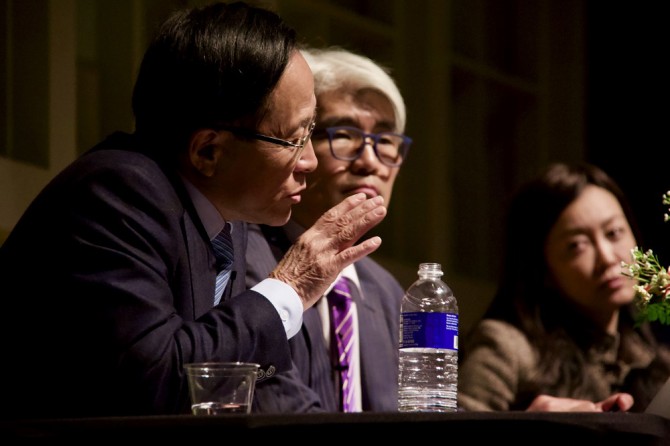For debaters, success on North Korea a question of expectations
By Jonathan Miller
Sometime in the next few weeks, two of the world’s most mercurial leaders are expected to sit across a table and try to resolve a decades-old crisis inflamed by deep distrust, outsized egos, the clashing interests of global powers and the risk of nuclear annihilation for hundreds of millions of people.
This after months of weapons tests, military maneuvers, personal insults and overt threats. Even the most seasoned Korea watchers are befuddled.
The situation is “extremely dynamic and remarkable,” South Korean politician and former diplomat Soo-Hyuck Lee told an audience of students, faculty, staff and community members at the Alice Statler Auditorium on April 23. Still, he said, “I’m a little more optimistic than before” about the prospects for peace.
Lee, who led South Korea’s delegation to the so-called Six-Party Talks between the U.S., China, Russia, Japan and the two Koreas from 2003 to 2005, said his optimism comes from his sense that North Korea’s leader, Kim Jong-Un, has finally proven that his country possesses nuclear weapons and is capable of delivering them to the mainland United States. With that settled, Lee reasoned, Kim is ready to talk.
Lee spoke at “How Should We Engage With North Korea?,” the latest in the Lund Critical Debates Series sponsored by the Mario Einaudi Center for International Studies and supported by Judith Lund Biggs ‘57. He shared the stage with Sue Mi Terry, a Korea specialist at the Center for Strategic and International Studies who has held several high-level posts in U.S. intelligence agencies.
“I’m also optimistic that there will be an agreement,” Terry said. “But getting to an agreement is not the hard part.” Citing a succession of bilateral and multilateral agreements with North Korea since 1994, she noted that Pyongyang eventually turned its back on each one.
“I think at least superficially, appearance-wise, there is going to be success,” she said of the expected U.S.-North Korea talks. “Trump will be able to come out of the meeting and say, ‘Oh look, I was able to get North Korea to do X-Y-Z that no other predecessor was able to achieve.’ There’s going to be a deliverable. Kim Jong-Un might even be able to blow something up” – satisfying both men’s desire for what she called “the CNN effect.”
“But does that lead to denuclearization of the north?” she asked. “Call me a cynic, but I have a real hard time seeing that.”
A serious risk, Terry said, is that a Trump-Kim agreement will come at the expense of U.S. allies South Korea and Japan.
“What if they offer us a deal on intercontinental ballistic missiles, saying, ‘No more long-range missiles that are going to threaten the U.S. homeland, but we get to keep short-range and medium-range missiles,’” she asked. “For Trump’s supporters, the president can spin that into, ‘Look, it’s a win, I have saved our homeland from being threatened by North Korea.’” But such an arrangement would leave South Korea and Japan even more vulnerable than they are now, she said.
Terry discounted Kim’s recent announcement that he was stopping all nuclear tests. “From my perspective, Kim Jong-Un has decided to make a tactical shift here,” she said. “He has decided that he is going to suspend the program, he is going to buy some time and wait out the Trump administration.”
Lee said it was premature to discuss in any detail the dismantling of North Korea’s nuclear arsenal, if only because it’s so technically complicated. For now, talks should focus on the steps required to achieve peace. But eventually “we must reach denuclearization,” he said. “Without denuclearization, the threat of war will persist on the Korean peninsula.”
Moderator Hirokazu Miyazaki, director of the Einaudi Center, asked Lee and Terry whether reunification of the Korean peninsula should be part of the negotiations. Both said no.
“None of the big powers wants to see reunification at this time, because reunification could be seen as a way to unbalance power in Northeast Asia,” Lee said.
“China’s interests are not quite aligned with the interests of the U.S.,” Terry added. “Not that China wants a nuclear North Korea. That we actually agree on. But our priority is different. The U.S.’s number one priority is denuclearization. China’s number one priority is stability, [a] buffer and preventing a unified Korea that is pro-United States.”
She added that most South Koreans see unification as costly and not worth the effort, while the Japanese regard a unified Korea as a potential economic competitor. For Kim Jong-Un, reunification represents an existential threat to what Terry called “the only Confucian communist hereditary dynasty in the world.”
Several students asked questions about human rights in North Korea. Both Lee and Terry stressed the importance of addressing human rights issues – particularly the detention of thousands of political prisoners and the suppression of dissent. But both said those concerns would have to wait until other issues are resolved. “North Koreans are very, very sensitive about this,” Terry said.
In closing remarks, Lee called for a redoubled commitment to patient negotiation and a suspension of bellicose rhetoric. “Let’s not talk about regime change in North Korea for the time being,” he said. “Let’s not talk about possible war on the Korean peninsula for the time being.”
For Terry, success in North Korea is a matter of managing expectations. “[I have come to] the conclusion that we cannot solve this crisis and that we can only manage it,” she said. “I’m not for conflict, I’m not for a military strike, I’m not for a ‘bloody nose.’ I think engagement is good, negotiation is good. [But] we need to walk in with a clear-eyed perspective…. If we can 75, 80 percent, 60 percent manage it, I think that’s good enough.”
Jonathan Miller is associate director of communications at the Einaudi Center.
Media Contact
Get Cornell news delivered right to your inbox.
Subscribe

